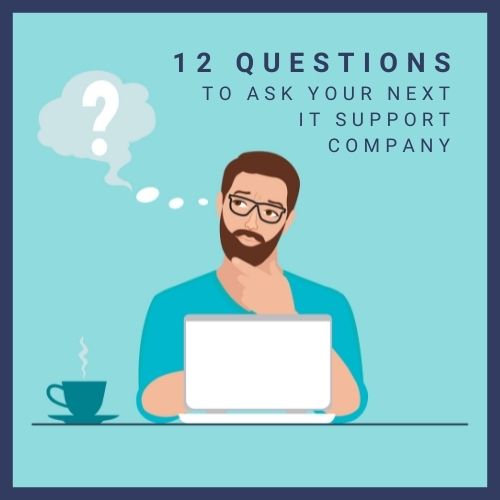
As a small business owner in Kansas City, you make products and services accessible to customers and companies of all shapes and sizes. But without effective IT services in place, your operations will not run as efficiently causing you to leave precious revenue and profit on the table.
Through working with over a hundred small business owners in Kansas City, we’ve found many Kansas City businesses struggle getting help desk support for their technology problems and IT strategies to get the business to the next stage. To have a well-oiled business, you need to have a reliable IT support partner in place to address technology problems in a timely manner and monitor your network for signs of failures and cyber-attacks.
If you are a Kansas City business owner, here are 12 questions to ask your next IT support company
1. When I have an IT problem, how do I get support?
In the IT industry, IT support companies have systems to manage your requests and IT issues. When a client has a problem, we “open a ticket” in these systems so we can properly assign, track, prioritize, resolve and document the various client issues we’re working on.
However, some IT firms force you to log in to a portal to submit a ticket and won’t allow you to call or e-mail them. This is for THEIR convenience, not yours. What do you do if the Internet is down, or you can’t log in to the portal? Trust me when I say this will become a giant inconvenience and thorn in your side. That’s not to say they shouldn’t offer that as an option, but it shouldn’t be your ONLY option for requesting support.
Also, make sure they HAVE a system in place to keep track of client “tickets” and requests. If they don’t, I can practically guarantee your requests will get overlooked, skipped and forgotten from time to time.
So, be sure to ask how you and your team can submit a problem to their support desk for resolution. Can you call them? Send an e-mail? Requesting support should be EASY for you.
2. Do you have a written, guaranteed response time to start working on resolving problems?
Most IT support firms offer a 60-minute or 30-minute response time to your call for help during normal business hours. Be very wary of someone who doesn’t have a guaranteed response time in writing – that’s a sign that they are disorganized and/or possibly understaffed to handle your requests. A written, guaranteed response time should be standard in every service agreement you sign.
3. Will I be given a dedicated account manager?
Smaller IT companies might not offer this due to staff limitations, and the owner may tell you they will personally manage your account. That sounds like great customer service, but the owner of the company is often pulled in so many directions that you’ll only get reactive support and reactive customer service instead of proactive account management.
4. Do you have a feedback system in place for your clients to provide “thumbs up” or “thumbs down” ratings on your service? If so, can I see those reports?
There are many applications that IT companies use to get customer feedback on the quality of service they’re providing – and great IT firms want that feedback to ensure their engineers are taking great care of their clients.
If they don’t have this type of system in place, be leery. If they DO have one in place, ask to see the actual scores and reporting. That will tell you a lot about the quality of service they are providing. A great IT firm with happy customers will be eager to share that information with you; someone who’s not delivering great support and not getting excellent scores will hide that fact or be hesitant to share that with you.
5. Do they offer true managed IT services and support?
You want to find an IT company that will proactively monitor for problems and perform routine maintenance on your IT systems. If they don’t have the ability to do this, or they don’t offer it, we strongly recommend you look somewhere else.
6. What is NOT included in your managed services agreement?
Another “gotcha” many IT companies fail to explain adequately is what is NOT included in your monthly managed services agreement that will trigger an invoice. Often, IT companies will tell you they offer an “all you can eat” option. That’s RARELY true – there are limitations to what’s included and you want to know what they are BEFORE you sign.
It’s very common for projects to not be included, like a server upgrade, moving an office, adding new employees and, of course, the software and hardware you need to purchase.
But here’s a question you need to ask: If you were hit with a ransomware attack, would the recovery be EXTRA or included in your contract? Recovering from a cyber-attack could take HOURS of high-level IT expertise. Who is going to eat that bill? Be sure you’re clear on this before you sign an agreement, because surprising you with a big, fat IT bill is totally and completely unacceptable.
Other things to inquire about being included are:
- Do you offer truly unlimited help desk? Sometimes agreements will give you a certain number of hours and then bill you for anything over that. Make sure you aren’t getting nickel-and-dimed for every call.
- Does the service include support for cloud services such as Microsoft 365?
- Do you charge extra if you have to resolve a problem with a line-of-business application, Internet service provider, phone system, leased printer, etc.? If they didn’t install it, do they support it or do they bill extra for it? What you want is an IT company that will own the problems and not point fingers. That may require them to call the vendor or software company on your behalf. Good IT companies will be happy to do that for you as part of their agreement. Others may refuse to or may bill you for the service. Clarify this up front.
- What about on-site support calls? Or support for remote offices?
- If your employees had to work remote (due to a shutdown, natural disaster, etc.), would you provide support on their home PCs or would that trigger a bill?
- If we were to get ransomed or experience some other disaster (fire, flood, theft, tornado, hurricane, etc.), would rebuilding the network be included in our service plan or considered a project that we would have to pay for? This is something you want to get IN WRITING. Recovering from a disaster such as this could take hundreds of hours of time for your IT company’s techs, so you want to know in advance how a situation like this will be handled before it happens.
7. Is your help desk Kansas City based or outsourced?
Be careful if they don’t maintain and manage their own local help desk. Smaller IT firms will outsource this critical function because they don’t have the ability or funds to hire their own team.
When they outsource to a third party, you may end up getting a tech who is not familiar with you, your network, previous problems and personal preferences. This can be frustrating and lead to the same problems cropping up over and over, longer resolution time for critical issues and you having to reeducate the tech on the history of your account. Ideally, look for a company that will dedicate a person and/or team to your account so they get to know you, your company, preferences and history, making them more capable of resolving problems and handling things the way you want them handled.
To make matters worse, it might take time for them to get someone onsite to help you. When you have a local Kansas City based help desk, they can often dispatch within the same day. This is especially critical if it’s an issue bringing one of your team members or the whole network down. It’s important to know the costs of downtime for your business. If we are being conversative with hourly pay for your staff at $15/hour, with 50 employees, 1 hour of downtime would cost you $750 in salary alone. If you’re a company doing $8M in annual revenue, you’ll lose roughly $900 in revenue in that same 1 hour. That’s $1,650 out of the gate without including potential future business loss, brand damage, and law suits.
8. Do you meet with your clients regularly as part of your managed services agreement?
Professional IT firms will offer to meet with you at least annually, semi-annually, or (sometimes more often) to provide a “technology review.”
In this meeting, they should provide you with the status updates of projects they’re working on and the health and security of your network. They should also be making recommendations for new equipment and upgrades you’ll be needing soon or sometime in the future and discussing with your future plans for expansion and contraction so they can support your business goals.
Those meetings should be C-level discussions (not a geek-fest) where IT budgets are discussed, as well as critical projects, compliance issues, known problems and, of course, cyber security best practices.
They should be constantly bringing you new ways to improve operations, lower costs, increase efficiencies and ensure that the productivity of your organization stays high. This is also your opportunity to give them feedback on how they’re doing and to discuss upcoming projects.
9. How do you lock down our employees’ PCs and devices to ensure they’re not compromising our network?
Like the above, the question may get a bit technical. The key is that they HAVE an answer, and don’t hesitate to provide it. Some of the things they should mention are:
- 2FA (two-factor authentication)
- Advanced end-point protection, NOT just antivirus
- Application Whitelisting
- Managed Detection and Response
- Ongoing Cybersecurity Training
- Dark Web Monitoring
- No administrative rights
10. Do you have a SOC and do you run it in-house or outsource it? If outsourced, what company do you use?
A SOC (pronounced “sock”), or security operations center, is a centralized department within a company to monitor and deal with security issues pertaining to a company’s network.
What’s tricky here is that some IT firms have the resources and ability to run a good SOC in-house (this is the minority of outsourced IT firms out there). Others cannot and outsource it because they know their limitations (not entirely a bad thing).
But the key thing to look for is that they have one. Less experienced IT consultants may monitor your network hardware, such as servers and workstations, for uptime and patches, but they might not provide security monitoring. This is particularly important if you host sensitive data (financial information, medical records, credit cards, etc.) and fall under regulatory compliance for data protection.
11. Have you, or any of your clients, ever been hit with ransomware or a major breach?
This is a tough question that will put them on the spot for sure. If they have been hit with ransomware or a major breach, I would not classify them as a “bad” IT company if they said yes to this question. What I would want to know is how it happened and what they have done to ensure it doesn’t happen again. I would like to know how they handled the situation, how it impacted their clients and what they did in response to the breach.
Sadly, it’s almost a question of “when,” not “if,” you get breached. At the time of writing this book, there have been breaches of MSPs that have been caused at the vendor level, not due to the fault of the MSP.
However, they should be open, honest and straightforward with their answer. If they get angry, defensive or appear to be covering something up, those are definitely warning signs you don’t want to ignore.
12. If you were to experience a location disaster, pandemic shutdown or other disaster that prevented you from being in the office, how would they enable you and your employees to work from a remote location?
If Covid taught us anything, it’s that work-interrupting disasters CAN happen and DO happen when you least expect them. Fires, floods, hurricanes and tornados can wipe out an entire building or location. Covid forced everyone into lockdown, and it could happen again.
We could experience a terrorist attack, civil unrest or riots that can shut down entire cities and streets, making it physically impossible to get into a building. Who knows what could be coming down the road? Hopefully, NONE of this will happen, but sadly it does.
That’s why you want to ask your prospective IT consultant how quickly they were able to get their clients working remote (and securely, I might add) when Covid shut everything down. Ask to talk to a few of their clients about how the process went.
At the end of the day, not every IT support company is going to be a fit for your Kansas City business. If they say they are a good fit for everyone, that’s a red flag. Use these questions as soup starters for criteria that are important for your business so you can make sure your next Kansas City IT company checks all your boxes off!









